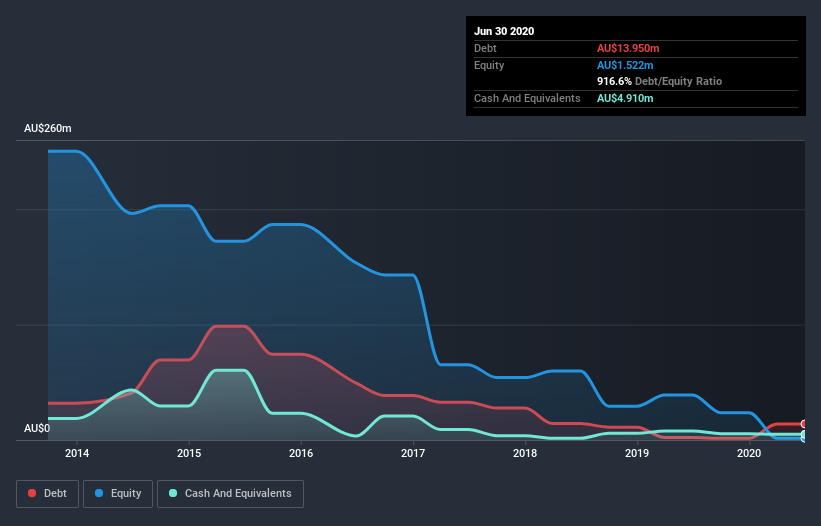
Unfortunately for shareholders, when Troy Resources Limited (ASX:TRY) reported results for the period to June 2020, its auditors, PricewaterhouseCoopers LLP, expressed uncertainty about whether it can continue as a going concern. It is therefore fair to assume that, based on those financials, the company should strengthen its balance sheet in the short term, perhaps by issuing shares.
If the company does have to issue more shares, potential investors will be sure to consider how desperate it is for capital. So shareholders should absolutely be taking a close look at how risky the balance sheet is. Debt is always a risk factor in these cases, as creditors could be in a position to wind up the company, in the worst case scenario.
See our latest analysis for Troy Resources
What Is Troy Resources's Net Debt?
The image below, which you can click on for greater detail, shows that at June 2020 Troy Resources had debt of AU$14.0m, up from AU$2.11m in one year. However, it does have AU$4.91m in cash offsetting this, leading to net debt of about AU$9.04m.

A Look At Troy Resources's Liabilities
According to the last reported balance sheet, Troy Resources had liabilities of AU$41.4m due within 12 months, and liabilities of AU$7.13m due beyond 12 months. Offsetting these obligations, it had cash of AU$4.91m as well as receivables valued at AU$1.37m due within 12 months. So its liabilities total AU$42.3m more than the combination of its cash and short-term receivables.
This deficit is considerable relative to its market capitalization of AU$61.9m, so it does suggest shareholders should keep an eye on Troy Resources's use of debt. This suggests shareholders would be heavily diluted if the company needed to shore up its balance sheet in a hurry. The balance sheet is clearly the area to focus on when you are analysing debt. But it is Troy Resources's earnings that will influence how the balance sheet holds up in the future. So if you're keen to discover more about its earnings, it might be worth checking out this graph of its long term earnings trend.
Over 12 months, Troy Resources made a loss at the EBIT level, and saw its revenue drop to AU$56m, which is a fall of 46%. That makes us nervous, to say the least.
Caveat Emptor
Not only did Troy Resources's revenue slip over the last twelve months, but it also produced negative earnings before interest and tax (EBIT). Its EBIT loss was a whopping AU$40.6m. When we look at that and recall the liabilities on its balance sheet, relative to cash, it seems unwise to us for the company to have any debt. So we think its balance sheet is a little strained, though not beyond repair. However, it doesn't help that it burned through AU$15.9m of cash over the last year. So in short it's a really risky stock. We prefer to avoid a company after its auditor has expressed any uncertainty about its ability to continue as a going concern. That's because we find it more comfortable to invest in companies that always keep the balance sheet reasonably strong. There's no doubt that we learn most about debt from the balance sheet. However, not all investment risk resides within the balance sheet - far from it. Be aware that Troy Resources is showing 5 warning signs in our investment analysis , and 2 of those don't sit too well with us...
At the end of the day, it's often better to focus on companies that are free from net debt. You can access our special list of such companies (all with a track record of profit growth). It's free.
If you decide to trade Troy Resources, use the lowest-cost* platform that is rated #1 Overall by Barron’s, Interactive Brokers. Trade stocks, options, futures, forex, bonds and funds on 135 markets, all from a single integrated account. Promoted
New: Manage All Your Stock Portfolios in One Place
We've created the ultimate portfolio companion for stock investors, and it's free.
• Connect an unlimited number of Portfolios and see your total in one currency
• Be alerted to new Warning Signs or Risks via email or mobile
• Track the Fair Value of your stocks
This article by Simply Wall St is general in nature. It does not constitute a recommendation to buy or sell any stock, and does not take account of your objectives, or your financial situation. We aim to bring you long-term focused analysis driven by fundamental data. Note that our analysis may not factor in the latest price-sensitive company announcements or qualitative material. Simply Wall St has no position in any stocks mentioned.
*Interactive Brokers Rated Lowest Cost Broker by StockBrokers.com Annual Online Review 2020
Have feedback on this article? Concerned about the content? Get in touch with us directly. Alternatively, email editorial-team@simplywallst.com.
Market Insights
Community Narratives



